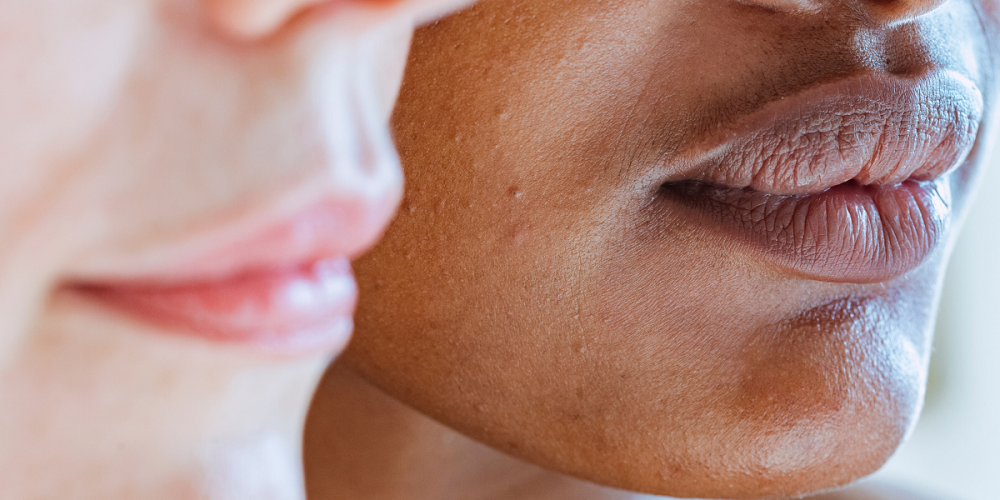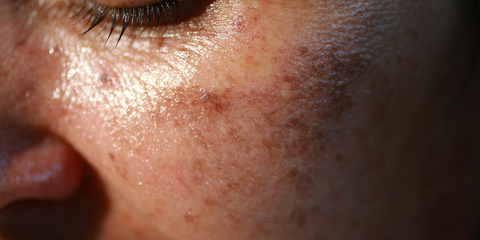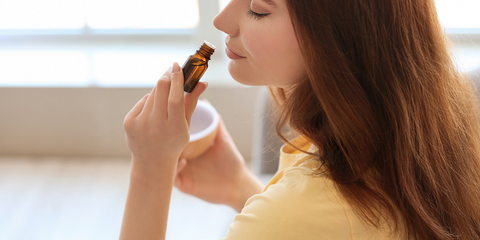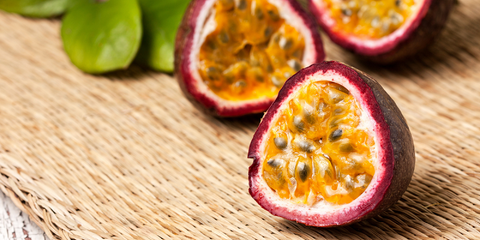
The Ultimate Guide to Skincare While Trying to Conceive
Share
Fertility treatments are a source of physical and emotional changes, your skin being one of them! Hormonal shifts due to medications and hormone changes can lead to unexpected breakouts, dryness or other sensitivities. In this guide we'll explore how fertility treatments can affect your skin, why it happens, and most importantly, provide gentle and effective solutions to care for your skin during this sensitive journey.
At SKINICIAN a few of our team members have been through IVF and fertility treatments, including our co-founder, Shelley Martin who states “I believe it is important to share our experiences and for me, if this can help just one person, I will be pleased. It is a challenging time and I was certainly through the mill over a 5 year period. Thankfully I had a good understanding of what to expect with regards to my skin and I would like to share my knowledge to help those going through fertility treatments and experiencing signs of stress on the skin.”
Watch Fertility Treatments & Skincare with Fertility Coach Sarah Banks & SKINICIAN Founder Shelley Martin
Understanding the Impact of Fertility Treatments on Skin Health
While the focus is often on the physical and emotional aspects of these treatments, one aspect that is sometimes overlooked is their potential impact on skin health. As we delve deeper into the world of fertility treatments we often get asked "Can IVF / ICSI / egg retrieval cause skin problems?"
At SKINICIAN we are here to help you understand the link between fertility drugs and skin problems. Why IVF causes skin changes and the connection between fertility treatments and skin health may not be immediately apparent, but it exists for some of us. Hormonal changes play a significant role in both fertility treatments and skin health. Many fertility treatments involve the use of hormones to stimulate egg production, regulate ovulation, or prepare the uterus for implantation. These hormonal fluctuations can have a direct impact on the skin, leading to changes in texture, tone, and even hormone-related acne flare-ups.
Fertility treatments are a rollercoaster of emotions, and sometimes, that rollercoaster spills over onto your skin. You might notice breakouts you haven't seen since high school, or your once-glowing complexion feels dull and dry. Don't be discouraged! These changes are incredibly common, and understanding the why behind them can empower you to take action.
The main reason for these unexpected skin troubles lies in hormones. Fertility medications work by adjusting your body's natural hormone levels and those fluctuations can impact things like your oil production and how your skin cells behave. When oestrogen or progesterone rises, it might trigger extra oiliness, which can, unfortunately, create conditions where acne is more likely. In other cases, medications can lead to less oil, leaving your skin feeling dry and uncomfortable.
During IVF treatment, oestrogen levels can increase ten fold due to injectable medications that stimulate egg and follicle growth. Not surprisingly, this has the potential to show up on your skin.
A study published in the Journal of Cutaneous Medicine and Surgery in 2018 found that around 27% of patients undergoing In Vitro Fertilization (IVF) experienced skin changes related to the treatments. The most common issue, affecting roughly 13.5% of patients, was a red, round, welt-like rash called hives (urticaria).
Hyperpigmentation: Another common skin issue where hormonal fluctuations can trigger melanin production, leading to dark patches or spots on the skin, commonly known as melasma. This condition is more prevalent in pregnant women due to the hormonal changes associated with pregnancy, but it can also occur in individuals undergoing fertility treatments.
Other Common Skin Concerns during Fertility Treatments

Acne: One of the most common skin concerns associated with fertility treatments is acne. Hormonal imbalances can stimulate the sebaceous glands to produce more oil, leading to clogged pores and breakouts. This is particularly common in treatments like IVF where high doses of hormones are used to stimulate egg production. So in short, yes IVF meds can cause acne.
Dry skin: During IVF skin can become dry due to hormonal fluctuations that can disrupt the skin's natural barrier function, leading to increased water loss and decreased moisture retention. This can leave the skin feeling dry, tight, and more prone to irritation.
Sensitivity: A common side effect to any hormonal shift in our bodies, could show as redness, broken capillaries, flushing, or even itchiness. At SKINICIAN we always say “listen to your skin and adapt your routine or products depending on how your skin looks and feels.”
In addition to skincare, lifestyle factors such as diet and stress, a natural part of the fertility treatment process, can also influence your skin. When stress levels are high, your body produces cortisol, a hormone that can worsen existing skin issues or even trigger new ones. Less sleep can also be a contributing factor if experiencing skin issues.
Access a skincare routine tailored for safe IVF practices and recommendations by clicking here
IVF Skincare practices to avoid

Avoid Harsh Chemicals: When selecting skincare products, opt for gentle formulations that are free from harsh chemicals, synthetic ingredients, phthalates alcohol, and parabens, which have been linked to hormone disruption, and could affect fertility.
Limit Retinoids: Retinoids, commonly found in prescription acne treatments and some over-the-counter skincare products, are known to be potentially harmful during pregnancy and may also pose risks when trying to conceive.
Salicylic acid is generally considered safe in low concentrations however it's best to avoid high concentrations or frequent use of leave-on products when trying to conceive. Opt for alternative acne-fighting ingredients like azelaic acid, lactic acid or glycolic acid.
Essential Oils: It is unknown how essential oils may react with medications during IVF and essential oils can cause skin sensitivity too. Oils in a diffuser or on a pillow are considered safe during treatments as reported here by Santa Monica Ferility Clinic: https://www.santamonicafertility.com/blog/essential-oils-to-avoid-when-trying-to-conceive.
Some essential oils may emit some volatile organic compounds (VOCs) and are considered hazardous. Some of these chemical compounds present in essential oils have an endocrine-disrupting ability. These chemicals can mimic the body’s natural hormones and interfere with their function. It is important to source good quality essential oils from reputable companies and consult your doctor as to their suitability as you move along your journey.
Examples of some to avoid in concentrated medicinal amounts:
- Sage
- Rosemary
- Ginger
- Jasmine
Different essential oils are believed to offer a variety of specific health benefits that may also aid fertility. Their benefits can range from hormone regulation to increased relaxation, anxiety reduction, mood stabilisation and even better sleep!
Hormonal beneficial oils:
Geranium oil may help support oestrogen production. It has been proven to be beneficial in the stimulation of salivary oestrogen. While sandalwood oil is beneficial to men and women by boosting testosterone levels and has a positive effect on libido which can be affected when trying to conceive. Ylang ylang oil is shown to support those suffering menstrual cramps while you wait to conceive and ease the journey.
Increased relaxation, reduction in anxiety and mood stabilisation:
Citrus essential oils such as orange, grapefruit and lemon may help to increase energy and improve mood. Along with Geranium they have been found to reduce depressive moods and anxiety both of which may hinder fertility.
Peppermint oil may be beneficial for those with endometriosis or suffer headaches or migraine induced by this journey. It also can be used throughout your fertility journey as a calming aid and beneficial for nausea or while pregnant and experiencing morning sickness.
Improve sleep quality:
Lavender essential oil has powerful sleep-inducive properties. It also helps to relax the mind and aid with anxiety by lowering our cortisol levels.
Other skincare questions that we have been asked
Is Hyaluronic safe during IVF? Yes, Hyaluronic Acid is naturally occurring in our bodies and found with the highest concentrations in our skin. It is exceptional at hydrating skin, plumping fine lines, and soothing irritation.
Can you use retinol before IVF?
It is widely recommended by dermatologists not to use Retinol immediately before IVF and fertility treatments.
Can you wear makeup during IVF?
We believe you should do what makes you feel happy, so yes if you want to.
Can you have botox before IVF?
No. Research is limited and dermatologists do not recommend botox during IVF or fertility treatment.
Ingredients to look out for and are safe for use during fertility treatment

AHAs - Alpha Hydroxy Acids are highly effective at exfoliating and removing old dull skin cells, to reveal smoother, brighter, and more luminous skin. At SKINICIAN, our formulation harnesses a blend of AHAs sourced from grape, pineapple, and passion fruit, naturally rich in glycolic acid, lactic acid, citric acid, and tartaric acid.
SPF - Protection from UVA/UVB rays and blue light are essential in any routine, to protect, shield and prevent sunburn, environmental damage, and ageing on the skin.
Niacinamide - Will help prevent hyperpigmentation on the skin and is a safe alternative to Hydroquinone. It can also help with acne or breakouts by fighting bacteria.
What are the best antioxidants for IVF?
Antioxidants help to shield cells from harm induced by free radicals. They play an important role in cell division, helping our cells communicate and assist your body in fighting against infection. Vitality is important while trying to conceive a healthy baby during your fertility journey.
Glutathione is often referred to as the ‘master antioxidant’. It is the most potent antioxidant that our bodies make! It’s one of the main detoxifiers and plays an imperative role in boosting immune health.
Astaxanthin due to its unique structure can span the cell membrane providing antioxidant protection to both inner and outer wall, as well as inter-cellular spaces. Often referred to as the ‘kind of antioxidants’.
Eating a diet rich in whole foods with the majority coming from a variety of plant-based food (fruit and vegetables) is the best way to ensure adequate antioxidant intake and support your body’s ability to produce your own naturally occurring antioxidants as listed above.
Coq10, vitamin C, vitamin E, flavonoids and beta carotene along with the minerals selenium and manganese also play a crucial role.
Importance of antioxidants in skincare
The skin cells continuously produce through cellular respiration metabolic process or under external aggressions highly reactive molecule oxidation products called free radicals. This is more often than regulated and neutralised by exogenous or endogenous enzymatic and non-enzymatic systems. Any change in this balance may aggravate and compromise the skin. The use of antioxidants are therefore beneficial by their nature of fighting these ROS (reactive oxygen species/Free Radicals.
Vitamin C protects the skin from irritation, inflammation and environmental pollution. It has a very protective while healing effect on the skin. It increases the effectiveness of sunscreen and gives the skin protection from UV rays. Its hydrating, brightening, evens out skin tone and fades hyperpigmentation, promotes collagen production and help boost wound healing.
Vitamin E is both a humectant and emollient so it helps your skin absorb and trap water. Its moisturisers helps wound healing, help prevent or minimise scar tissue, and help to prevent and treat fine lines. The body stores vitamin E in the skin hence why many skincare products contain vitamin E to replenish lost stores.
These two antioxidants are perfect partners due to Vitamin C being highly unstable on its own but when combined with vitamin E the formula will become more balanced. Vitamin C and Vitamin E together give a synergistic effect as vitamin E helps prevent vitamin C from being oxidized quickly.
Eating a balanced diet rich in fruits, vegetables, and omega-3 fatty acids can help support overall skin health. Practicing stress-reducing activities like yoga, meditation, or deep breathing exercises can also help mitigate the effects of hormonal fluctuations on the skin.
Safe IVF Skincare Practices for Those Trying to Conceive
Here, we look at how to care for your skin during IVF fertility treatments.
When trying to conceive, individuals often become more conscious of the products they use and the ingredients they expose themselves to, and skincare is no exception. While skincare is essential for maintaining healthy skin, it's crucial to be mindful of certain ingredients and practices that may impact fertility or pose risks during pregnancy. Here are some safe IVF skincare practices for those trying to conceive:
First and foremost, it's essential to maintain a consistent skincare routine that is tailored to your skin type and concerns during IVF. To help make that easy and hassle-free, we recommend this routine for starters:
Step 1: Cleansing during IVF: in any skincare routine.
Cleansing Balm, this balm to oil cleanser, melts away your make-up, is safe to use on your eyes, and is a really nice way to de-stress at the end of the day, as well as removing the daily build-up of toxins on the skin.
Depending on your skin type, you can then treat the skin with a second cleanse and we recommend Revitalising Cleanser for sensitive, dry or balanced skin and Purifying Cleansing Gel for those with oily skin or acne/breakouts.
Step 2: Hydration during IVF: These options depend on what your skin needs to treat any concerns.
Hyaluronic Elixir - For all skin types, in particular dry, sensitive, or itchiness on the skin.
Calming Serum - For sensitive skin types, in particular, redness, inflammation, rosacea, and acne on the skin.
Firming Serum - For dry skin, showing signs of fine lines or sagging. This is excellent under make-up with immediate smoothing effects.
Vitamin C Elixir - A powerful anti-oxidant to help with signs of pigmentation, dull or dark spots on the skin.
Step 3: Skin protection with SPF during IVF: Daily Defence SPF 50 - For all skin types, offering the ultimate protection against blue light, UVA/UVB rays and environmental aggressors.
Purifying Day Moisturer SPF 30 - for those with oily skin who would benefit from a mattifying effect.
Step 4: At Night: We recommend an ultra-nourishing and restoring Vitamin E Night Cream and/or Vitamin C Elixir to brighten, hydrate, and protect the skin.
Weekly: It will be important to exfoliate the skin more regularly especially if dryness or flaking is apparent. Take time to yourself twice per week and incorporate our Pro Radiance Enzyme Cleanser and Pro Radiance Enzyme Peel - a chemical exfoliator that helps to brighten and reveal new glowing skin, helping you feel more confident in your skin.
At SKINICIAN you can be assured that all of our products are vegan friendly, cruelty free and never tested on animals and our products are made with 90% naturally derived ingredients on average.
If your skin is experiencing extreme sensitivity or itchiness, opt for fragrance-free skincare such as Hyaluronic Elixir and Daily Defence SPF 50.
We also highly recommend a relaxing facial at a SKINICIAN clinic near you. If you are experiencing acne, you can opt for a glycolic resurfacing peel. Otherwise, a treatment from our menu with relaxation incorporated could be just what you need.
Small changes in your routine can really help you control your skin during fertility treatment.
Don’t forget to take time for selfcare during IVF
Self-care during fertility treatments can be incredibly comforting, lowering stress levels and anxiety that come with this challenge.

Shelley shared her top tips:
“I found it incredibly powerful during my IVF journey to focus on what I could control and what I could do to make myself feel present and be more like myself. As women we tend to go all in on a subject and it can become overwhelming and an unhealthy obsession.
My weekly self-care included a full skincare regime that included cleansing, toning and a mask or peel for 20 minutes while meditating and using visualisation techniques. My 1st round of IVF was at Christmas, so I would lie in the dark with the Christmas tree lights on, and try to relax with my skincare on whilst meditating. I also did Arvigo (Maya) massage, acupuncture, and reflexology. This included abdominal massage and relaxation techniques with reflexology which I found incredibly helpful throughout my whole fertility journey as it allowed me to relax and switch off.
I guess coming from the professional skincare industry, I believe in the power of touch.
My other love in life is travel and just before my 2nd round of IVF we went on a sunny holiday where we ate, drank, sunbathed, and enjoyed ourselves. To me that was self-care with a dose of vitamin D."
Sarah Banks: Fertility Coach and Founder of 'The IVF Positivity Planner'

Sarah - What helped you?
"Managing my negative thoughts – I saw a life coach during our second cycle to help me feel more positive about the cycle. She really helped me manage the negative thought spirals just by saying to myself ‘stop worrying, it won’t help and will only make things worse.' This helped break that thought pattern and reminded me that it wasn’t helpful to think that way.
I also tried to take control of the things I could – eating well, trying to get more rest, working on my mindset, booking hotels when I had an early morning transfer so I didn’t worry about getting stuck in traffic, planning other things so I didn’t feel like my life was on hold, and journaling about how I was feeling really helped.
I set myself goals outside of getting pregnant – I felt like my life was on hold and I was stuck in a rut, so I started thinking about what I wanted to do – getting a new job, plans as a couple, plans with friends, and I started creating an action plan that I could work towards so I felt like I had control of some part of my life.
I also organised things with friends so that I had some enjoyment in my life and a distraction from treatment."
Partners: How to support during IVF?
- You could offer to help with injections – it takes the pressure off your partner and helps you feel involved in the process. You could make it into a little routine of time together and talk about how you are both feeling about treatment.
- Offer to accompany them to appointments where possible. This provides moral support for her and she will feel less alone.
- Ask her how she would like to be supported. Does she want to talk about it? Does she just want to have a cry and a hug? Does she need you to take on the practical side of things so it's one less thing to worry about?
- If she needs and wants distraction, plan nice things together outside of treatment. It doesn’t need to be big or expensive, just time together away from treatment and TTC.
Expert advice and resources for support during your fertility journey
By understanding the link between fertility treatments and skin issues and implementing a targeted skincare routine, individuals can navigate these challenges with confidence and minimise the effects on their skin. Remember, skincare is not one-size-fits-all, so don't hesitate to consult with us for personalised recommendations tailored to your specific needs.
Other resources:Fertility Network UK: https://fertilitynetworkuk.org/
HFEA: https://www.hfea.gov.uk/
NHS: https://www.nhs.uk/conditions/ivf/
Women’s Health Network: womenshealthnetwork.co.uk
Beacon Care Fertility: https://www.beaconcarefertility.ie/
SIMSIVF: https://www.sims.ie/
Irish Fertility Councillors Association: https://fertilitycounsellors.ie/
Reading:
IVF Positivity Planner: https://positivityplanners.com/products/the-ivf-positivy-planner
It Starts with an Egg by Rebecca Fett: https://www.amazon.co.uk/dp/B0CGY1M4KP
Some other common questions from the experience of Sarah and Shelley:
What not to say to an IVF Patient?
Sarah highlights: If you haven’t been through a struggle to conceive or through IVF it can be difficult to know what to say to someone who is going through it.
The best thing you can say is ‘I’m sorry for what you are going through, I’m here if you need me, how can I help you?’ They will be able to tell you what they need from you, whether that is someone to listen to, someone to distract them, or someone to talk through options.
As well-meaning as it may be, try to avoid offering advice unless you fully understand the situation or your friend has asked for it. Comments like ‘just relax and it will happen’, ‘it will happen if you stop trying’, and ‘my friend fell pregnant naturally when they went on holiday’ can invalidate how they are feeling or make them feel like it is their fault for not being relaxed enough. It is important to consider there may be a medical reason they are unable to get pregnant naturally.
Should you tell people your going through IVF?
Shelley: "Each person deals with things in their own way. From experience, it is easier for others around you to understand why you're not drinking, why you don’t want to go out, or why you don't yet have kids. Friends and family can support and avoid these types of comments or inappropriate questions. I didn’t tell people on my first attempt but I did on my second which made everything so much easier."
Sarah: "I agree, it’s completely down to you and how you feel about it. Telling people can lead to extra questions that you might find challenging, but it can also lead to a lot more support and understanding. You could use it as an opportunity to educate them and get the support you need. It can also be helpful to tell someone at work as you will need flexibility and quite a bit of time off, so having someone that understands and can cover for you can take away some of the stress."
Is IVF painful?
Sarah: "Not really, no. It can be embarrassing and slightly uncomfortable having the internal scans, but they weren’t as bad as I was expecting. Most clinics sedate you for your egg collection so you won’t remember any of it and you might just feel a bit uncomfortable afterwards. I found that when I was embarrassed or feeling a bit uncomfortable, it really helped to just keep saying to myself ‘I’m doing this to hopefully have a baby and that got me through it."
Shelley: "No not really, I had cramps after egg collection for a few hours (and I wasn’t sedated), but that was all. Injecting yourself isn’t much fun, but needs must, so you just get on with it."
We hope you have found this information helpful, should you need help with your skin journey whilst trying to conceive, please reach out to us at SKINICIAN.
